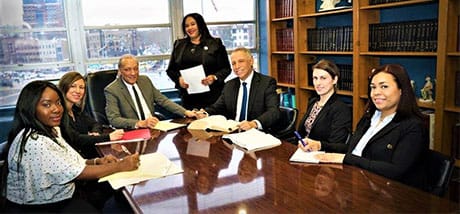Murder, Fraud Case Takes Unusual Turn

By Robert E. Kessler – STAFF WRITER
NEWSDAY – WEDNESDAY, JULY 12, 2000
The very bad news recently for [Defendant], a Long Island City millionaire, was that a federal judge ruled that he had murdered his wife in Hicksville in 1999.
The good news at the same time for [Defendant] was that the judge also decided that the jury hearing the [Defendant’s] case involving mail fraud would not be told about the homicide ruling.
The decisions, which might seem contradictory, were the latest twists in the unusual case of [Defendant], 63, of 43-20 40 th St., who is not charged with the murder of his wife in a state court, but who is charged in a federal case with defrauding her.
[Defendant’s] case ended up in a federal court because prosecutors say they have enough evidence to charge him under federal law with defrauding his late wife, Ourida, of half of their $1.4 million in joint assets, and also of money laundering, while Nassau detectives are still continuing to investigate her murder.
Ourida Bessaha, 54, was found murdered with 20 hammer blows to her skull in January, 1999, in her Hicksville home on Brittle Lane.
Federal prosecutor Gary Brown had argued in pre-trial hearings before Federal District Court Judge Leonard Wexler in Hauppauge that the government should be allowed to introduce evidence at [Defendant’s] fraud trial to show that he had murdered his wife to prevent her from keeping her share of the money.
The evidence would include statements she made as part of a messy divorce proceeding the couple was going through.
[Defendant’s] attorney, Todd Greenberg, of Forest Hills, denies his client is guilty of either fraud or the murder.
Usually, in fairness during trials, the statements of a dead person cannot be used against a defendant because the witness is not available to be cross-examined by defense attorneys. The Sixth Amendment to the Constitution normally guarantees the right of a defendant to confront an accuser, and court procedures bar the admission of statement made outside of court, so-called hearsay statements.
But there is an exception to these constraints on evidence from dead people because of a 1982 federal case, involving a Huntington man named Richard Mastrangelo, who was sentenced to 9 years in prison for smuggling drugs from Columbia. The principal evidence against Mastrangelo was the grand jury testimony of a man who was subsequently murdered before he could testify at trial. The Supreme Court eventually ruled that Mastrangelo was involved in the witness’ murder and criminals should not be allowed to benefit from the killings of such witnesses.
To determine if the testimony of the deceased can be allowed at trial, the court established a pre-trial hearing, known as a Mastrangelo hearing. These are exceedingly rare, and prosecutors and defense attorneys could recall only a handful of them in the metropolitan area. Under the procedure, federal prosecutors do not have to prove guilt beyond a reasonable doubt, as in homicide cases, to allow the admission of the alleged victim’s testimony, but only on the preponderance of the evidence.
After [Defendant’s] Mastrangelo hearing, Wexler ruled two weeks ago that [Defendant] had ‘procured the unavailability of his wife to testify,’ and, thus, her statement about his fraudulent financial activities will be allowed at trial.
Wexler agreed that prosecutors had complied a mountain of evidence pointing to [Defendant’s] involvement in his wife’s death: He had made threats against her; he had asked his children if the locks on her home had been changed; the murder took place a day before a divorce proceeding in which [Defendant] stood to lose hundreds of thousands of dollars; there was no evidence of forced entry, theft or rape at the crime scene; and ‘there was evidence of a footprint at the crime scene that was consistent with the defendant’s shoe.’
Also making ‘a strong impact on the court,’ Wexler said, was the fact that though [Defendant] was with police for many hours after his wife died, ‘he never asked if his wife’s death was the result of a crime, natural causes or of an accident.’
But while allowing the jury to hear the wife’s testimony in the divorce proceedings, Wexler ruled that the jury will not be told of [Defendant’s] possible role in his wife’s death because it would be too prejudicial in a fraud trial.
Greenberg, [Defendant’s] attorney, said he disagreed with the judge’s ruling but could appeal it only if his client is convicted. Federal prosecutors declined to comment.
Nassau detectives are still conducting an investigation into the murder, sources say. This is because while there is a preponderance of evidence to link [Defendant] to his wife’s murder, there is still the possibility that a jury might not find him guilty beyond a reasonable doubt with the evidence gathered so far.
But such a local investigation may be beside the point if [Defendant] is convicted of the federal fraud charges.
Normally, federal fraud and money laundering charges carry only an 8-year prison sentence. But if convicted, [Defendant] could face as stiff a sentence as if he had been convicted of murder. Under federal sentencing guidelines, a trial judge can impose a life sentence if he believes that fraud and money laundering were related to murder.

